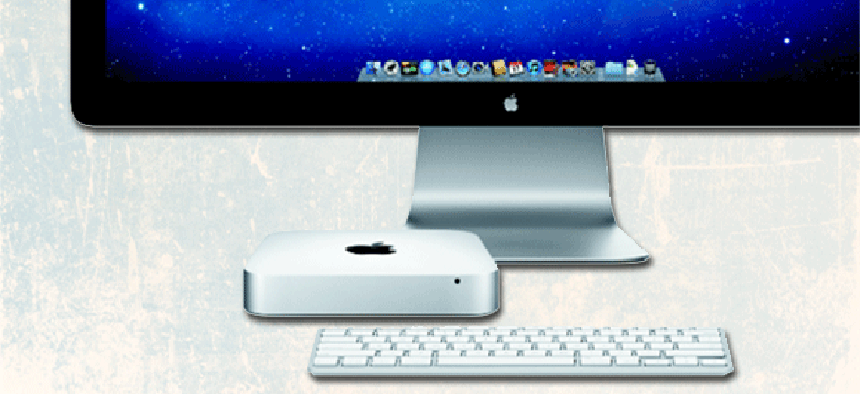Could Apple desktops, servers find their way into government?


Connecting state and local government leaders
With agencies adopting iPhones and iPads, the company's OS X desktops and Mac Minis are getting a fresh look.
Apple products have long had a love/hate relationship with government. There were even stories of employees at agencies like NASA hiding their Mac desktops in closets when PC-only police came calling.
But that was a long time ago. Today, it seems everyone wants an Apple iPad or iPhone. If nothing else, they are certainly in the mix when looking at new mobile hardware. Each week there's more news about iPads making inroads in the public sector. Just recently, the Defense Department announced that employees now can take meetings on their iPads. And DOD doesn’t do anything it doesn’t think is secure.
It’s a safe bet to say that the iPhone and the iPad, and really Steve Jobs, saved Apple’s foothold in government. But what about non-mobile hardware and applications? Macs may be more common in higher education, but there has never been nearly as much push towards Apple desktops or servers in government.
Part of the reason, of course, is that Microsoft won that battle. Windows PCs have become ubiquitous in government, and switching over to Mac would be a big step, perhaps an impossible one because of all the Windows-based applications. Plus there is always the price issue. Building out an agency with Wintel-based PCs is cheap. Doing the same thing with Apple desktops would be much more expensive. And that’s not even considering the many flavors of Linux are out there, which are also an increasingly attractive option.
So Apple may never be able to capture a huge number of agency users outside of mobile, but factors are in place now to at least give them a chance. For one, a recent GCN review found that OS X Mountain Lion is a robust, security-conscious architecture that was enterprise-ready in a way no Apple OS had been before.
And at least some people feel that may lead to greater acceptance of the desktop Mac platform. The Gartner Group predicted that Apple desktops would make significant enterprise inroads by 2025, based largely on the strength of OS X and the fact that the interface is similar to that found on the iPad, InfoWorld reported.
Apple may be trying to do what Microsoft did with Windows 8, and create a similar interface across all platforms. It’s been a winning strategy for Windows 8, which recently earned an almost complete lock-down over future DOD desktop computers.
On the server side, there has been even less enthusiasm from either Apple or government to look at serous implementation. However, Slashdot reports that Mac Minis are growing as the servers of choice with some organizations. Incredibly easy to setup, the Mac Minis are nonetheless far from being powerhouses. But their architecture allows for idle Minis to seamlessly come online to help out if one of their brethren is getting overloaded. They kind of form a mini-cloud that way, without any user intervention, an attractive feature.
As a low-cost server room option for some government applications, they may be worth a look. And when Apple replaces its current 2.5-inch traditional hard drives with flash media (and does it without a huge spike in price), reliability and performance will improve to where Apple may become competitive in government installations.
That's not to say that government should suddenly embrace Apple completely for its enterprise applications. But at least for some agencies like the Bureau of Alcohol, Tobacco and Firearms, which is dropping BlackBerrys in favor of iPhones, or the National Oceanic and Atmospheric Administration, where mobile employees are adopting iPhones and iPads as part of a security and mobility upgrade, the new OS X features, and the similar interface it offers to the mobile world, might make Apple on government desktops and in server rooms worth a second look.




